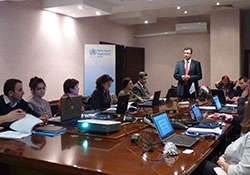Training course on strategic planning and costing of health system interventions in Tajikistan

WHO/Tahmina Alimamedova
WHO actively supports Tajikistan's Ministry of Health in building capacity to plan and cost priority interventions included in the country's National Health Strategy 2010-2020. As part of this effort and within the Health Policy Analysis Support Project funded by the European Union, WHO provided intensive training on the OneHealth costing tool on 22–25 October 2012 in Dushanbe, Tajikistan.
The OneHealth tool is a software application developed to help countries estimate the resource requirements, including human resources, for implementation of a comprehensive and integrated national health strategic plan.
The training was facilitated by Ms Rachel Sanders, Futures Institute of USA, and attended by selected specialists of the Ministry of Health, including the Health Policy Analysis Unit. Their objective was to learn how to:
- apply the OneHealth Tool to cost selected interventions of the Tajik Basic Package, with a special focus on maternal-health-related interventions and generating basic costing projections;
- assess health system implications for scaling up and ensuring sustained delivery interventions, including related programme activities;
- develop and compare alternative scenarios for planning scaling-up actions, and examining the financial implications and the expected reduction in the disease burden;
- identify other areas of strategic planning for health that could benefit from applying the OneHealth Tool.
Speaking during the opening session on behalf of the WHO Country Office in Tajikistan, Dr Pavel Ursu stressed the importance of strengthening the skills of health managers in the area of strategic planning and assessment of health systems. He noted that "to ensure quality implementation of medical services for the population, the health system requires efforts on budgeting and costing. It is important that the primary function of health facilities enables health care workers to deliver high-quality care that meets the health needs of the population being served."
Ministry of Health representatives showed much interest in the training and noted that this tool could greatly help in their current efforts to better plan, rationalize and budget health interventions.
Following this training, WHO will continue to provide technical assistance to the Ministry of Health in concretely costing a number of priority interventions, especially in preparation for the 2014 budget cycle.



